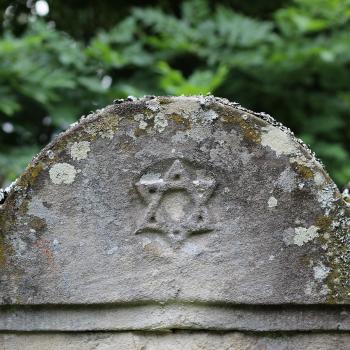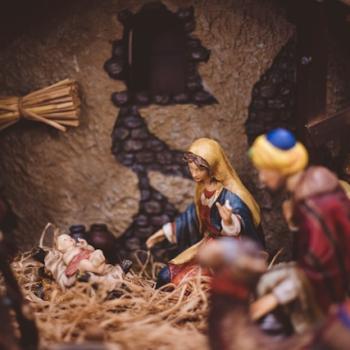In the months after that recommitment, my experience as a gymnast was transformed. I trained harder than I had ever trained before, and I grew stronger on every event. Every night I left the Stanford gym exhilarated and grateful to God. It felt as though God and I were rider and horse working together and charging to the front of the pack.
Gymnastics, then, lay right at the dynamic center of my relationship with God. It was my school of faith, and I can no more regret gymnastics than I can regret my faith itself.
The third reason for my gratitude is because gymnastics showed me my own horizon, where my power ends and the power of God begins. If what Christians believe is true, then a life is not wasted if it is lived in suffering. A life is wasted if it is lived in such lavish comfort and superficiality that the deeper needs of the soul are never exposed. As the Danish philosopher Søren Kierkegaard once wrote, too many men and women waste their lives "buying cakes and sweets," living lives of distraction and self-gratification. It is better to "buy sufferings," for when one suffers in fellowship with God then one has made a "purchase for eternity." In other words, suffering tends to reveal what passing pleasures tend to obscure: the sacred and everlasting need of every man and woman for God.
Even in the best of times, gymnastics always reminded me of my limitations. Athletes are not merely posturing when they say they are humbled by their awards and titles. My own victories always felt more like gifts than accomplishments. "You work hard," people said, "you deserve this." I do not deserve anything. An athlete must fail many times before he can win, and I was always conscious of all my mistakes, all the ways in which I was lucky, all the reasons I did not deserve to win. In a thousand and one ways I could have lost every competition I won, and it was only divine grace that gave me the talents and opportunities and victories that I enjoyed.
I am grateful even for the broken neck and chronic pain. I praise God not in spite of my injury, but for the injury too. God is not primarily interested in protecting me from hardship; God did not become flesh and suffer crucifixion in order to confer on me a life of ease and self-indulgence. I am inclined by nature to pride and the presumption of self-sufficiency. God gave me a thorn in the flesh in precisely the right spot: a moment-by-moment reminder of my weakness, my emptiness, my absolute and inextinguishable need for Him.
I am grateful that God did not wait until the end of my life to show me my powerlessness in the face of misfortune and mortality. I am grateful to be reminded every hour of every day that God's strength is found in my weakness and God's life is found in my death. I feel the stabs of pain radiating from my neck as hunger pangs for God, a hunger that would otherwise be all too easy to bury.
* * * * * *
After the neurosurgeon informed me that my neck was broken, a strange thing happened. I knew at once that I would not enter the Promised Land of the Olympic Games. Still, I will never forget the wellspring of joy that rushed suddenly up within me.
My body was broken, my gymnastics dreams were finished. So why did I feel such joy streaming through me that I began to laugh aloud? More than I ever had before, I experienced a profound assurance of divine presence and love. This persisted throughout my hospital stay, and it cast my circumstances in a different light. If I could know the peace of God even when my health and hopes were stripped away from me, then what did I have to fear? It was a liberating revelation. Since God is with us even in the valley of the shadow of death, we need fear no evil, for no evil can take God away.
Had God not preserved me already? I broke my neck in warm-ups for an insignificant competition, when I fell from the horizontal bar and landed awkwardly on my back and shoulders, loading pressure on my cervical spine. At first, it was not painful. It felt as though a hot water balloon had burst within my neck. I checked to make sure I could move my extremities, then I leapt back on the horizontal bar. I went on to tumble on the floor exercise, continuing my warm-up. The competition started, and I am one of few people who can claim to have competed with a broken neck. I only withdrew as the pain began to mount, and two more days passed before I walked into the Stanford Hospital.
I could have been paralyzed for the remainder of my natural life. I am grateful that I was spared this fate, and grateful that God found me through gymnastics and through suffering.
I regret neither my gymnastics career nor the way in which it ended. To regret gymnastics would be to regret the hand of God in my life, to regret how God formed and used me. And to regret the suffering I have endured would be to regret one of the greatest instruments God has used for that purpose, a crucible God has used to refine and reform me.
Gymnastics was my school of faith, and the pain with which it left me is my hidden companion, my secret with God, a constant reminder of the one thing I must never forget: that I need God and nothing else. Thank God, thank God that I was not allowed to waste my life buying sweets.
The Olympics, it turns out, was never the Promised Land. I found the Promised Land in that hospital room, and God used gymnastics to bring me there.
For similar articles, including interviews of Samantha Peszek and Dominique Moceanu, please see our series on Gymnastics, Faith and Olympic Glory.





